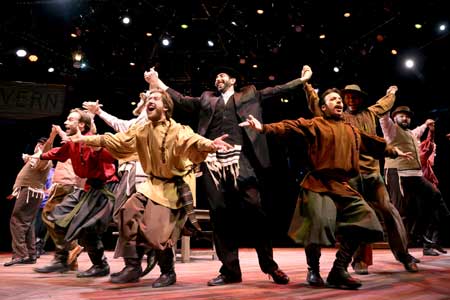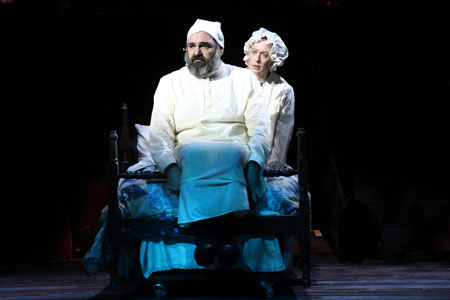Musical (1964)
Music by Jerry Bock
Lyrics by Sheldon Harnick
Book by Joseph Stein
Based on stories by Sholom Aleichem
Produced on the New York stage by Harold Prince
Original New York stage production directed and choreographed by Jerome Robbins
Directed by Robert W. Schneider
Music direction by Miles Plant
Original choreography reproduced by Josh Assor
North Shore Music Theatre
Beverly, MA
June 4-16, 2024
Scenic Design: Ryan M. Howell, Costume Coordinator: Kelly Baker, Lighting Design: Jack Mehler; Sound Design: James Cannon; Hair and Wig Design: Rael Padula-Shufelt
With Jeremy Radin(Tevye), Alaina Mills (Golde), Ellie Fishman (Tzeitel), Melody Munitz (Hodel), Sophie Aknin (Chava), Kathy St. George (Yente), Jordan Matthew Brown (Motel), Ari Axelrod (Perchik), Felix Herbst (Fiddler), Patrick Wetzel (Lazar Wolf), Elora Von Rosch (Fruma-Sara), James Turner (Constable), Tyler Okunski (Fyedka) Robert Saoud (Rabbi), Mary Callanan (Grandma Tzeitel), Adalyn Daly (Shprintze), Madeline Zechman-Frontierro (Bielke), Jonathan Hashmonay (Mordcha), Andrew Leggieri (Mendel), Billy Goldstein (Avram), Daniel Pahl (Nahum), Villagers of Anatevka: Parker Aimone, Ryan Blackson, Connor Coughlin, Ofer Gordon, Rachel Kay, Meagan Lewis-Michelson, Kayden Oliver, Tori Sicklick, Nicole Weitzman, Matt Wiercinski

Photo: © David Costa
Courtesy of North Shore Music Theatre
Tevye (Jeremy Radin) the milkman has five daughters, three of marriageable age, and, according to tradition, it is his job to see that they find decent marriages. The rich but old butcher Lazar Wolf (Patrick Wetzel) approaches Tevye to offer his hand to Tzeitel (Ellie Fishman), Tevye’s oldest, but she is already secretly in love with Motel (Jordan Matthew Brown), a poor tailor. When confronted with this, Tevye has to come up with a scheme to convince his wife Golda (Alaina Mills) that Tzeitel should marry Motel rather than Lazar Wolf. Meanwhile, the next oldest, Hodel (Melody Munitz), is secretly falling in love with the young Marxist student, Perchik (Ari Axelrod), and Chava (Sophie Aknin), the next daughter, is falling in love with Fyedka (Tyler Okunski), a non-Jewish Russian intellectual. It’s all a bit too much for Tevye, and he continues to carry on arguments with Golda, and conversations with God, about what to do about it all.
This wonderful and lively production has a relatively short run at this estimable and established home of musical theatre on the north shore of Boston, but the complexity of some of the staging and the professionalism which the production exhibits betrays its brief appearance. Some of the choreography – wonderfully adapted from the Jerome Robbins original by Josh Assor – is quite complex and one wonders how in a short time this company, brought from far and wide, is able to master its details with a relatively short window of rehearsal time. But they do, and the results are impressive. At one point, circles of Jewish characters from Sholom Aleichem’s fictional town of Anatevka mix in centrifugal abandon with groups of Russian soldiers and the effect is dizzyingly effective.

Alaina Mills as Golde
in “Fiddler on the Roof”
Photo: © David Costa
Courtesy of North Shore Music Theatre
In the role of Tevye – the anchor of the show – Jeremy Radin does a masterful job of acting, calling forth the historic evocations of Zero Mostel, who originated the role on Broadway, and Topol, who realized the role in the 1971 film directed by Norman Jewison. Radin’s movements and gestures are so like those of Mostel’s and Topol’s – the precise upper body gesticulations included – and the lamentations and sighs so evocative of their iconic embodiments – that his depiction is a celebration of dramatic interpretations as well as exhibiting its own unique flair. Radin seems built for the role, and his embodiment of it breathes fully with its spirit. Radin’s singing, at times, has more of a peasant’s than an operatic baritone’s tonalities, but that seems to fit appropriately with the demands and features of the role.

with his family
Photo: Courtesy of The Forward
Filling out and artfully embellishing the core of the parental unit is Alaina Mills’ sharply focused and highly adept evocation of Golde, Tevye’s wiry and ferociously insistent marital counterpart. Mills plays her role with incredible finesse and pointed humor, and the interplay between Jeremy Radin’s fuzzily warm depiction and Alaina Mills’ awl-sharp one is hilarious and full of vitality. Indeed, when they come to their absolutely lovely duet Do You Love Me?, it carries its vividly emotional weight on the back of a forceful and a very funny contrariness.

Ellie Fishman as Tzeitel
Melody Munitz as Hodel
in “Fiddler on the Roof”
Photo: © David Costa
Courtesy of North Shore Music Theatre
The three marriageable daughters are all excellent in their own ways. As Tzeitel, Ellie Fishman is hilarious in the trio Matchmaker, Matchmaker in which she impersonates Yente, the old matchmaker to whom they look for eligible matrimonial candidates. Fishman gives it her all in that hilarious depiction and her capacities as a comic actress as well as an excellent vocalist come through vividly. As Hodel, the daughter who falls for the Marxist student, Melody Munitz – my niece! – is vivid, direct, evocative, with a strong dramatic presence, and, with Fishman as Tzeitel and Sophie Aknin as Chava, does a great job in making Matchmaker, Matchmaker a terrific moment. But her most vivid vocal capacities come through in her wonderful solo ballad Far From The Home I Love, the poignantly dramatic expression of her love for Perchik and her sadness at leaving home to be with him. As Chava, Sophie Aknin fills out this adept and capable trio, particularly strong in her participation in Matchmaker, Matchmaker, and in adeptly carrying the difficult drama of her role as the daughter who falls in love with a non-Jew.
As Yente, seasoned Boston-area actress Kathy St. George, is fabulous – full of sharpness, wry humor, insinuation, manipulation, directness. Her embodiment of this characteristically over-the-top role is just perfect in its pure over-the-topness, but St. George makes the role believable as well. As Motel, Jordan Matthew Brown is beautifully nebbishy, and great in his celebration of coming a bit out of his nebbishy shell in Wonder of Wonders. And as Perchik, Ari Axelrod is very good dramatically, but shows his stuff vocally in Now I Have Everything where the clear and expressive quality of his voice comes through.

in “Fiddler on the Roof”
Photo: © David Costa
Courtesy of North Shore Music Theatre
In the important but understated role of the fiddler, Felix Herbst is truly wonderful. His violin playing is flawless and evocative, and his presence is thoughtful and contributes in an understated but significant way to the overall spirit of the production.
Music, under the direction of Miles Plant, and in the capable hands of a twelve-person orchestra, was right on the mark.
There are many great supporting roles in this large and exuberant production, directed capably by Robert W. Schneider. At almost three hours, the show is quite long but it really moves along, filled with humor, drama, poignancy, and well worth the trip to this venerable home of musical theatre just north of Boston.
– BADMan (aka Charles Munitz)
Leave a Reply